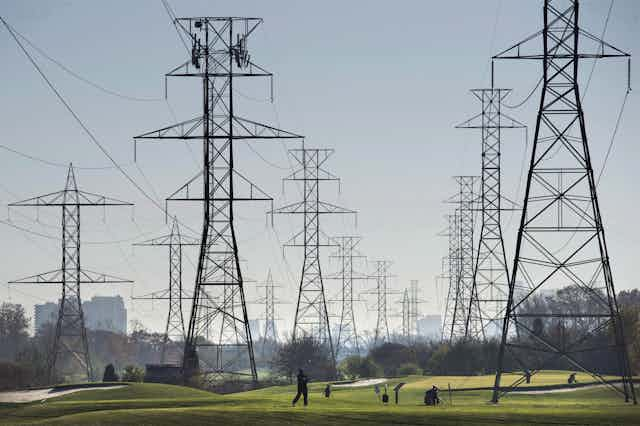This summer, Albertans faced a substantial increase in their electricity bills as prices surged. My own electricity bill more than doubled to around $115 compared to the usual $30 to $50 range for a single person in a condominium.
In 2021, electricity prices in Alberta ranged from seven to 10 cents/kWh. In 2022, prices increased to between 10 and 17 cents/kWh. In response, the Alberta government introduced a $500 electricity bill rebate that was distributed in instalments from July 2022 to April 2023.
However, residential electricity prices continued to soar, reaching to around 29 and 33 cents/kWh in early 2023, and consistently exceeding 25 cents/kWh from July onward. Once the rebate expired in April 2023, consumers were left to handle these high costs on their own.
At the root of the issue is Alberta’s deregulated electricity market, which has resulted in market power being concentrated in the hands of a few power companies.
Deregulated market
In the past, Alberta used to have some of the lowest electricity prices in North America. However, prices experienced a sharp increase in 2001 when the electricity market was deregulated. This decision was made because natural gas-based power plants could be constructed more quickly compared to coal-based plants.
The problems of insufficient capacity and market power are characteristic of the deregulated electricity market. In my doctoral thesis on Alberta’s electricity market deregulation, I found that supply was unable to keep up with demand for several years post-deregulation and electricity was sold at prices higher than marginal costs of production. These same issues still persist today.
In Alberta, generators must compete in an open, unregulated market. This means that, unlike in a regulated market, there is no guarantee that generators in Alberta earn enough revenue to cover their fixed costs unless they raise their prices.
Reasons for high electricity prices
Aside from the deregulated market, a few other reasons have been given for the province’s high electricity prices. One is the increasing frequency and severity of heat-related weather events like heat waves and wildfires.
Historically, few people in Alberta had air conditioners, but that has changed over the last decade as summers have grown hotter. In 2021, temperatures neared 40 C.

Additionally, some have pointed to the carbon tax as a contributing factor to the high prices. However, the federal carbon tax does not apply to the electricity sector and the provincial equivalent only adds a minimal 0.3 cents/kWh to the electricity price.
High electricity prices can also be attributed to the increase in natural gas prices, Alberta’s main source of electricity generation. Prices surged by more than 60 per cent following the Russian invasion of Ukraine as the European Union sought to transition away from Russian energy imports.
Lastly, Alberta has also been slow to add new power plants to the province. Since electricity providers only turn a profit when they’re actively supplying electricity to the grid, there is little incentive to maintain standby generation, which is crucial during periods of high electricity demand.
Re-regulating the electricity market
Since electricity is an essential service, it’s crucial to have regulations in place to curb the market power of large corporations. When only a few companies have ownership of all the power plants, they are able to exercise market power and raise prices as they see fit.
Research shows that establishing long-term contracts between utilities and plant owners and implementing average cost-based pricing can curb issues of market power and high electricity prices.

A gradual approach toward re-regulation could involve integrating the costs of newer power plants into the regulated system while terminating the power pool market with the retirement of older power plants. A properly regulated market would not see power prices increase the way they did this past summer.
End of rebates and deferred repayment
Under Alberta’s Affordability Action Plan, electricity prices were capped at 13.5 cents/kWh from January to March 2023, even though market prices were approaching 33 cents/kWh during that period.
To bridge the gap between the market rate and the capped rate, the government provided a $200 million loan to Alberta utility companies. This loan is expected to be paid back and has added $10 to $20 to monthly electricity bills.
While the government of Alberta has said that electricity rebates don’t need to be repaid, the deferred costs associated with the price cap are to be recouped over the next 21 months.
The higher electricity prices are due to both the expiration of rebates and the deferred repayments kicking off. To put this into perspective, Albertans will be forced to pay off the $200 million while the province is in the midst of considering giving $20 billion in royalty credits to oil and gas companies to clean up old wells, which they are already legally obligated to do.
What can consumers do?
Alberta’s deregulated electricity market exacerbates inequity. While some will be able to reduce their electricity bills by switching from market electricity rates to fixed contracts, this solution is only available for those with higher credit scores.
Fixed contracts often require credit checks, come with additional fees or impose exit fees for ending contracts. This means Albertans with low credit scores will end up stuck with the market rates and remain responsible for the deferred repayment costs.
Given these circumstances, there is a vital role for the government to play in preventing low-income Albertans from being exploited by the deregulated electricity market. At the very least, the government should relieve people of the $200 million deferred repayment burden instead of providing corporations with a $20 billion benefit.

